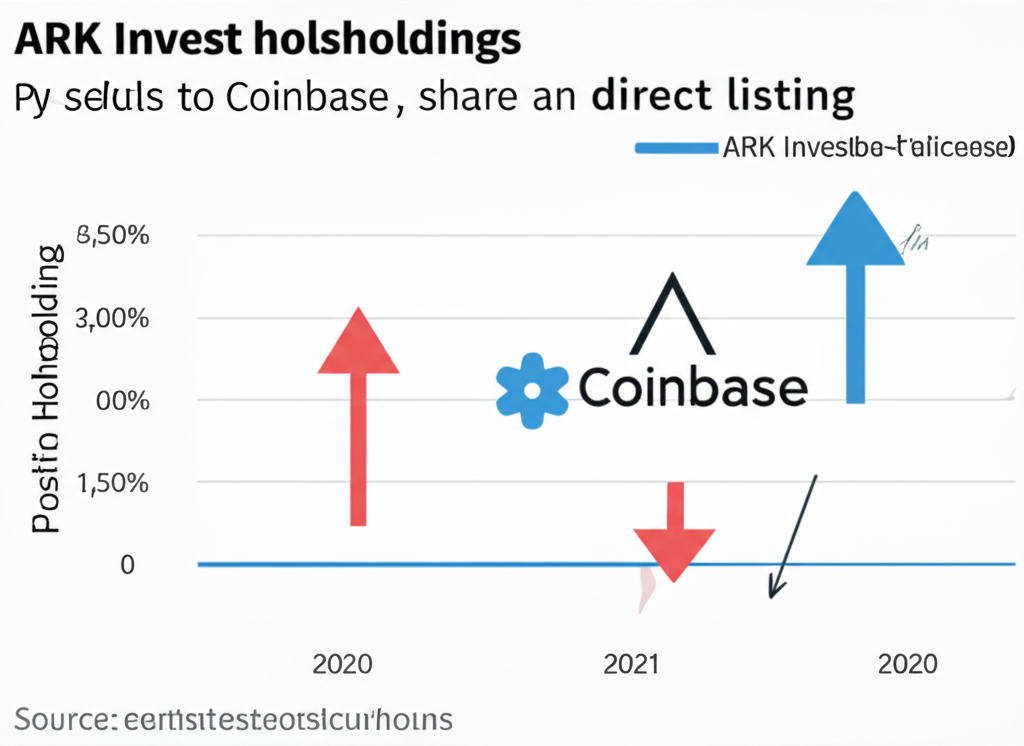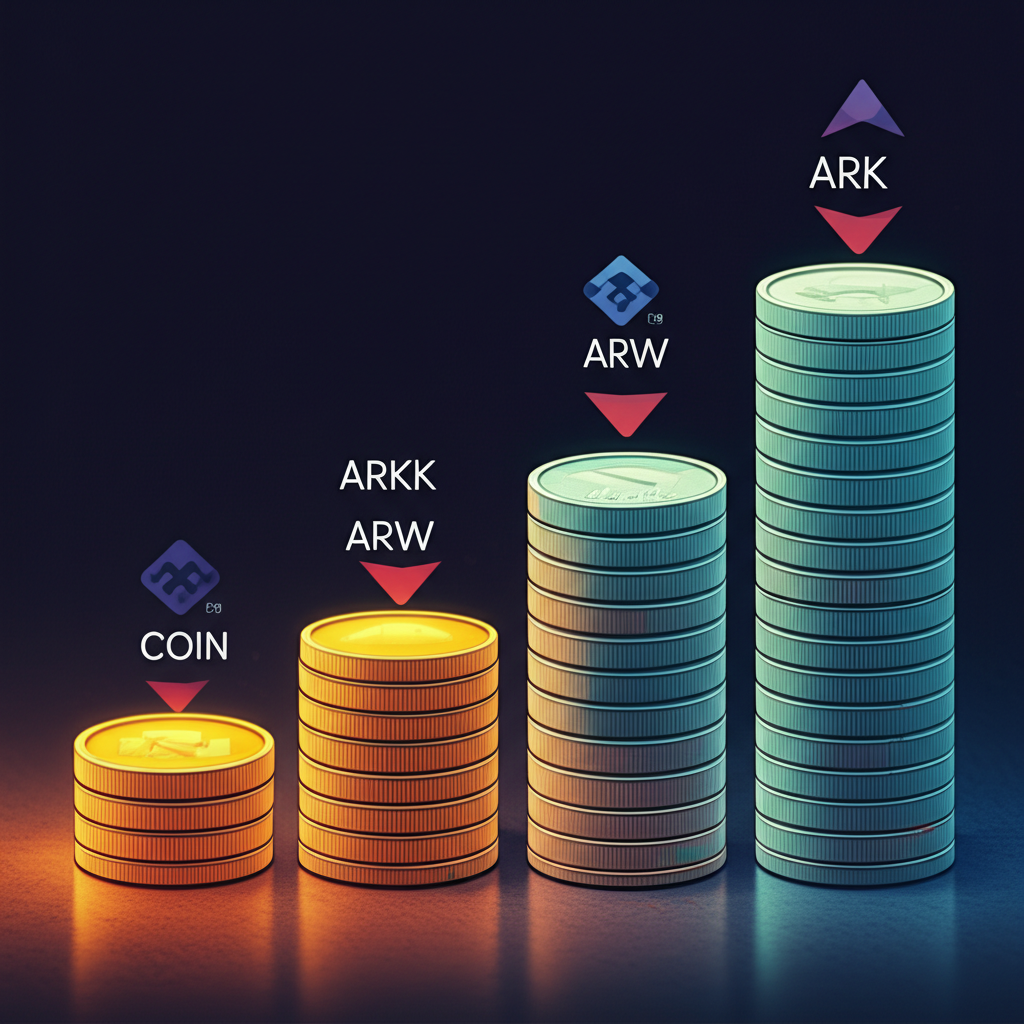Introduction: Cathie Wood, ARK Invest, and the Coinbase Saga

Cathie Wood, the founder and CEO of ARK Invest, has carved a distinctive path in modern finance by championing high-risk, high-reward investments in companies poised to reshape industries. Her firm has become synonymous with bold conviction in disruptive innovation—technologies like artificial intelligence, genomics, and blockchain that promise to redefine economic structures. Among these, cryptocurrency stands out as both a frontier and a focal point, and few assets encapsulate ARK’s strategy more vividly than Coinbase Global Inc. (COIN). Since the exchange’s public debut, ARK Invest has maintained a highly visible and active position in the stock, marked by repeated waves of buying and selling that reflect not just market timing, but a deeper philosophy rooted in long-term transformation. This ongoing relationship between Wood’s funds and the leading U.S. crypto platform has drawn intense scrutiny, serving as both a bellwether for retail investors and a case study in how innovation-focused portfolios are managed in volatile markets.
A Historical Overview of ARK Invest’s Coinbase Transactions

ARK Invest’s involvement with Coinbase began at a pivotal moment in the evolution of digital assets—the company’s direct listing on Nasdaq in April 2021. Unlike a traditional IPO, this route allowed early investors and employees to sell shares directly, bypassing underwriters. For ARK, it represented an immediate opportunity to gain exposure to a regulated, publicly traded gateway into the crypto economy. The timing was significant: the broader market was experiencing a surge in interest in digital currencies, with Bitcoin and Ethereum reaching new highs. Cathie Wood wasted no time, deploying capital through multiple ARK ETFs to build a substantial stake in COIN within days of its market debut. What followed was a multi-year narrative of strategic accumulation and tactical exits, shaped by shifting macroeconomic conditions, regulatory uncertainty, and the cyclical nature of crypto markets.
Coinbase’s Debut and ARK’s Initial Accumulation

When Coinbase began trading on April 14, 2021, it marked a watershed moment for the cryptocurrency industry—one that ARK Invest was poised to capitalize on. Within the first weeks, ARK’s flagship funds, including the ARK Innovation ETF (ARKK) and the ARK Next Generation Internet ETF (ARKW), took aggressive positions in COIN. At its peak, Coinbase became one of the top holdings in ARKK, reflecting Wood’s confidence in the company as a foundational infrastructure player in the digital asset revolution. The rationale was straightforward: Coinbase offered a compliant, user-friendly entry point for mainstream investors and institutions, making it a prime beneficiary of rising crypto adoption. Unlike holding Bitcoin directly—which poses custodial and regulatory challenges for traditional ETFs—owning COIN stock allowed ARK to participate in the ecosystem’s growth while remaining within the bounds of conventional financial regulation.
Key Periods of Buying and Selling: A Transaction Timeline
ARK’s engagement with Coinbase has never been a passive buy-and-hold strategy. Instead, it embodies an active, research-driven approach to portfolio management. The firm regularly adjusts its positions based on valuations, market sentiment, and anticipated macro shifts. Throughout 2021, as crypto markets soared, ARK continued to accumulate COIN during price pullbacks, applying a form of dollar-cost averaging in a high-volatility environment. In 2022, amid the “crypto winter” triggered by rising interest rates and the collapse of major players like FTX, ARK viewed the resulting price declines as a buying opportunity. They steadily increased their stake as the stock fell below $50 per share, reinforcing their long-term thesis.
The pattern reversed in late 2023 and early 2024, when ARK began a series of notable sales. As optimism returned to the sector—fueled by the approval of spot Bitcoin ETFs and a broader market rally—Coinbase’s stock surged from around $60 to over $250. During this period, ARK offloaded hundreds of thousands of shares across its ETFs. These transactions were not signs of fading confidence but part of a disciplined rebalancing strategy designed to lock in gains and prevent any single holding from dominating a fund’s portfolio.
To better understand the rhythm of ARK’s activity, consider the following conceptual timeline:
| Date Range (Example) | Activity | Estimated Shares | Rationale (Conceptual) |
| :——————- | :——- | :————— | :——————— |
| April – June 2021 | Initial Buys | Millions | New listing, high conviction |
| Q4 2021 – Q2 2022 | Accumulation | Varying | Market downturn, dollar-cost averaging |
| Late 2023 – Early 2024 | Significant Sells | Hundreds of thousands | Profit-taking after rallies |
This table illustrates the ebb and flow of ARK’s strategy: entering decisively, adding during weakness, and exiting partially during strength to maintain portfolio balance.
Analyzing Recent Major Sales: Profit-Taking or Strategy Shift?
The sell-offs in late 2023 and early 2024 sparked speculation among market observers. Did ARK lose faith in Coinbase? The evidence suggests otherwise. According to filings and public commentary, the sales were consistent with ARK’s long-standing practice of trimming positions that have appreciated rapidly. When a stock like COIN surges, its weight within an ETF can grow disproportionately, increasing concentration risk. By selling a portion of the stake, ARK reduces that risk and frees up capital to redeploy into other high-conviction ideas that may be temporarily out of favor. As reported by financial outlets such as *Bloomberg*, this kind of rebalancing is routine for actively managed funds, especially those with concentrated portfolios like ARKK. The goal isn’t to exit entirely, but to preserve gains while maintaining exposure to the company’s future potential.
The “Why” Behind the Trades: Cathie Wood’s Investment Thesis for Coinbase
Understanding ARK’s moves requires stepping back from individual trades and examining the broader investment framework that guides Cathie Wood’s decisions.
Disruptive Innovation and Crypto Exposure
At the core of ARK Invest’s philosophy is the pursuit of “disruptive innovation”—technological advancements that create new industries or radically transform existing ones. Cryptocurrency and blockchain technology rank among the most transformative trends ARK follows. Coinbase, as a licensed exchange with robust security, compliance infrastructure, and a growing suite of financial services, is seen as a critical enabler of this shift. It acts as a bridge between traditional finance and the decentralized future, allowing users to buy, sell, store, and earn digital assets with relative ease. For ARK, COIN isn’t just a stock; it’s a strategic proxy for the entire crypto adoption curve. While the firm doesn’t hold Bitcoin directly in its actively managed ETFs, investing in Coinbase offers a regulated, liquid way to benefit from increased transaction volumes, institutional adoption, and the expansion of decentralized applications.
Coinbase’s Role in ARK’s Diversified Portfolio
Coinbase is not confined to a single fund. It appears across ARK’s suite of actively managed ETFs, including ARKK, ARKW, and ARK Fintech Innovation ETF (ARKF), each targeting different aspects of innovation. In ARKK, it represents exposure to next-generation financial platforms. In ARKW, it aligns with the rise of decentralized internet infrastructure. And in ARKF, it fits within the broader fintech revolution. This multi-fund presence underscores ARK’s view of Coinbase as a versatile and foundational player. Its business model—generating revenue from trading fees, subscription services, staking, and institutional solutions—provides diversified income streams that could grow alongside the broader ecosystem. Even as the stock price fluctuates, ARK maintains COIN as a high-conviction holding, adjusting size based on valuation and opportunity cost, not sentiment.
Market Dynamics and Macroeconomic Factors Influencing ARK’s Decisions
ARK’s trading decisions are deeply intertwined with macroeconomic and market cycles. The cryptocurrency sector is notoriously volatile, driven by speculative sentiment, regulatory news, and macro forces like interest rates. ARK tends to be contrarian: buying when fear is high and selling when euphoria takes over. For example, during the 2022 crypto downturn, when many investors fled the space, ARK increased its stake in COIN, viewing the price decline as an overreaction to short-term headwinds. Conversely, in early 2024, as the Federal Reserve signaled potential rate cuts and spot Bitcoin ETFs were approved, ARK took profits, anticipating a short-term peak in sentiment. Regulatory clarity—such as the SEC’s eventual approval of Bitcoin ETFs—also plays a role, as it reduces uncertainty and can accelerate institutional participation, benefiting platforms like Coinbase. ARK’s trades are thus not random but calibrated responses to a complex web of signals.
Impact and Implications of ARK’s Coinbase Activity
Cathie Wood’s prominence ensures that ARK’s trades rarely go unnoticed, especially in a speculative sector like cryptocurrency.
Short-Term Market Reactions to ARK’s Trades
Thanks to ARK’s transparency—publishing daily trade disclosures—its moves are closely monitored by traders and algorithms alike. When ARK buys a large block of COIN shares, it can act as a bullish signal, reinforcing confidence and sometimes triggering short-term price bumps. Conversely, when the firm sells, even for routine rebalancing, it can create momentary selling pressure as other investors interpret the move as bearish. These reactions are often fleeting, but they highlight the influence ARK wields in niche, momentum-driven markets. The psychological impact of Wood’s actions can sometimes outweigh the actual size of the trade, especially among retail investors who view her as a visionary leader in the tech investing space.
Long-Term Outlook for Coinbase in ARK’s Portfolio
Despite the active trading, ARK’s long-term stance on Coinbase remains positive. Cathie Wood has repeatedly emphasized that digital assets are still in the early innings of adoption, with potential use cases expanding into areas like decentralized finance (DeFi), non-fungible tokens (NFTs), and tokenized real-world assets. Coinbase is positioned to play a central role in this evolution, not just as an exchange but as a custodian, developer platform, and compliance leader. The company’s efforts to diversify beyond spot trading—into lending, staking, and institutional services—align with ARK’s vision of a maturing crypto economy. While the exact weighting of COIN in ARK’s funds will continue to fluctuate, it is expected to remain a core holding for the foreseeable future. A major shift would likely only occur if the fundamental thesis—crypto’s long-term relevance or Coinbase’s competitive position—were to deteriorate significantly.
Interpreting ARK’s Moves: A Guide for Retail Investors
For individual investors, mimicking ARK’s trades without context can be misleading. ARK manages large, complex portfolios with specific mandates, liquidity needs, and compliance requirements. Their frequent rebalancing is a necessity of scale, not necessarily a commentary on a company’s prospects. Retail investors should avoid treating ARK’s daily disclosures as trading signals. Instead, they should use them as one input among many—alongside fundamental analysis, technical trends, and personal risk tolerance. Understanding *why* ARK buys or sells—whether due to valuation, portfolio concentration, or macro shifts—provides more value than simply copying the action. The key is to align investment decisions with long-term goals, not short-term market noise.
Common Misconceptions and Clarifications
Public fascination with Cathie Wood and cryptocurrency has led to several widespread misunderstandings.
Does Cathie Wood Buy Bitcoin Directly for ARK Funds?
A common misconception is that ARK’s flagship ETFs, such as ARKK or ARKW, hold Bitcoin directly. They do not. These actively managed funds gain exposure to the crypto economy through equities—companies that benefit from blockchain adoption, like Coinbase, Block (formerly Square), and others. Direct ownership of cryptocurrencies presents regulatory, custodial, and tax challenges that make them unsuitable for traditional ETF structures. However, ARK did launch a dedicated product for direct exposure: the ARK 21Shares Bitcoin ETF (ARKB), which holds Bitcoin in cold storage and is designed for investors seeking pure-play exposure. ARKB operates separately from ARKK and other active funds, serving a different segment of the market. This distinction is crucial for understanding ARK’s overall strategy.
Coinbase vs. Other Crypto Holdings: What Else is ARK Investing In?
While Coinbase is a primary vehicle for crypto exposure, ARK’s portfolio includes a range of companies positioned across the blockchain value chain. Block, Inc. (SQ), for instance, is a significant holding due to its Cash App platform, which allows users to buy Bitcoin, and its ongoing blockchain development through the TBD division. ARK has also held positions in futures-based crypto ETFs like ProShares Bitcoin Strategy ETF (BITO) in certain funds, though these are less common due to contango risks. Additionally, the firm invests in companies involved in blockchain infrastructure, digital identity, and decentralized finance protocols. This diversified approach allows ARK to capture multiple facets of the innovation cycle, reducing reliance on any single company or technology. For real-time insights into ARK’s full holdings, investors can visit ARK Invest’s official website, which updates daily.
Conclusion: The Evolving Relationship Between Cathie Wood and Coinbase
The story of Cathie Wood and Coinbase is more than a tale of stock trades—it’s a reflection of how visionary investing unfolds in real time. ARK Invest’s dynamic engagement with COIN underscores a philosophy that blends unwavering long-term conviction with tactical flexibility. Buying during downturns, selling during rallies, and continuously reassessing valuations are not contradictions but complementary elements of a disciplined approach. Coinbase remains a cornerstone of ARK’s strategy, offering a regulated, scalable way to participate in the rise of digital assets. For investors, the takeaway is clear: ARK’s moves should be studied, not copied. They reveal a sophisticated process shaped by research, risk management, and a deep belief in technological transformation. To stay informed, investors should rely on primary sources and credible financial reporting, such as CNBC’s coverage of Cathie Wood, while conducting their own due diligence. In the fast-moving world of disruptive innovation, understanding the strategy behind the trade is far more valuable than the trade itself.
Frequently Asked Questions About Cathie Wood and Coinbase
1. Did Cathie Wood’s ARK Invest recently buy or sell Coinbase (COIN) stock?
ARK Invest frequently buys and sells Coinbase (COIN) stock as part of its active portfolio management strategy. They often accumulate shares during market dips and trim positions after significant price rallies. For the most up-to-date information, investors should check ARK Invest’s daily trade disclosures.
2. What is Cathie Wood’s long-term investment philosophy regarding Coinbase?
Cathie Wood views Coinbase as a key player in disruptive innovation, providing essential infrastructure for the burgeoning cryptocurrency and blockchain ecosystem. Her long-term philosophy is bullish on Coinbase’s potential to benefit from the increasing adoption of digital assets and its role as a regulated gateway to the crypto economy.
3. Which specific ARK Invest ETFs hold Coinbase shares?
Coinbase (COIN) stock is typically held across several ARK Invest actively managed ETFs, most notably the ARK Innovation ETF (ARKK), ARK Next Generation Internet ETF (ARKW), and ARK Fintech Innovation ETF (ARKF).
4. How do ARK Invest’s trades typically impact Coinbase’s stock price?
Due to ARK Invest’s prominence, their significant buying or selling of Coinbase shares can sometimes trigger short-term market reactions. Large purchases may signal institutional confidence, while large sales can lead to temporary selling pressure, though these effects are often transient.
5. Does Cathie Wood believe Coinbase is a good investment for the future of cryptocurrency?
Yes, Cathie Wood and ARK Invest maintain a strong long-term conviction in Coinbase. They see it as a foundational company that will continue to thrive as the cryptocurrency market matures and expands, providing a secure and regulated platform for digital asset transactions.
6. Is it true that Cathie Wood bought $80 million worth of Bitcoin directly?
No, this is a common misconception. Cathie Wood’s actively managed ARK ETFs (like ARKK) do not directly hold Bitcoin or other cryptocurrencies. Their exposure to the crypto market is primarily through companies like Coinbase. However, ARK Invest did launch a separate spot Bitcoin ETF (ARKB) in partnership with 21Shares, which *does* directly hold Bitcoin.
7. How does Cathie Wood’s Coinbase strategy compare to her investments in other disruptive technologies?
ARK’s strategy for Coinbase aligns with its broader approach to disruptive technologies: identifying leading innovators in emerging sectors. Similar to how they invest in Tesla for electric vehicles or Zoom for remote work, Coinbase is seen as a leader in the cryptocurrency and blockchain space, fitting the thesis of profound technological transformation.
8. What percentage of ARK’s portfolio is allocated to Coinbase?
The percentage of ARK’s portfolio allocated to Coinbase (COIN) fluctuates regularly due to active management, market price changes, and ARK’s buying and selling activity. Investors can find the current weighting for each ARK ETF on the official ARK Invest website’s fund pages.
9. What are the main risks Cathie Wood identifies with her Coinbase investment?
While bullish, Cathie Wood and ARK acknowledge risks such as regulatory uncertainty in the crypto space, intense competition from other exchanges, potential for prolonged crypto market downturns impacting transaction volumes, and evolving technological landscapes. These factors influence their dynamic trading decisions.
10. Has Cathie Wood ever completely divested from Coinbase in her portfolios?
No, Cathie Wood’s ARK Invest has never completely divested from Coinbase across all its portfolios since its initial investment. While they frequently trim positions and rebalance, Coinbase has remained a core, high-conviction holding within their relevant ETFs.

留言